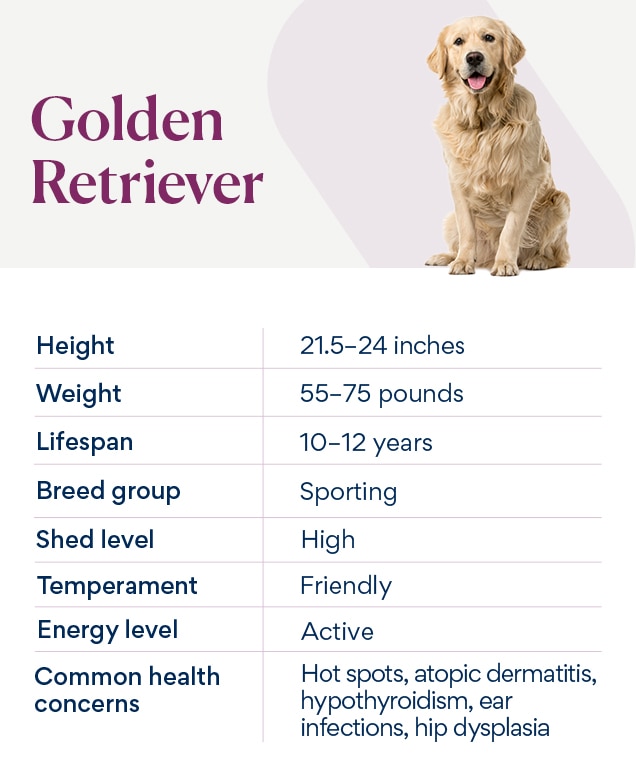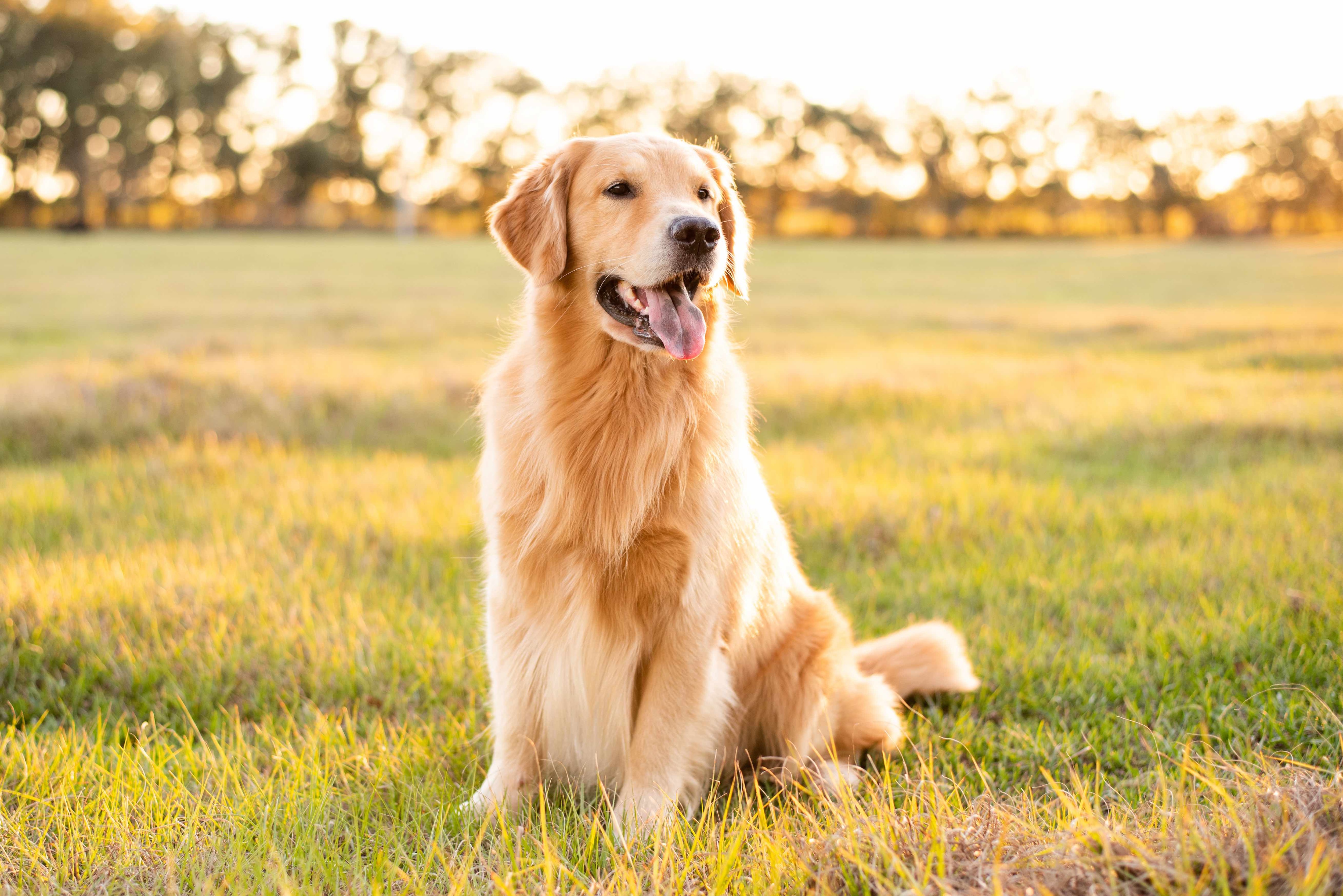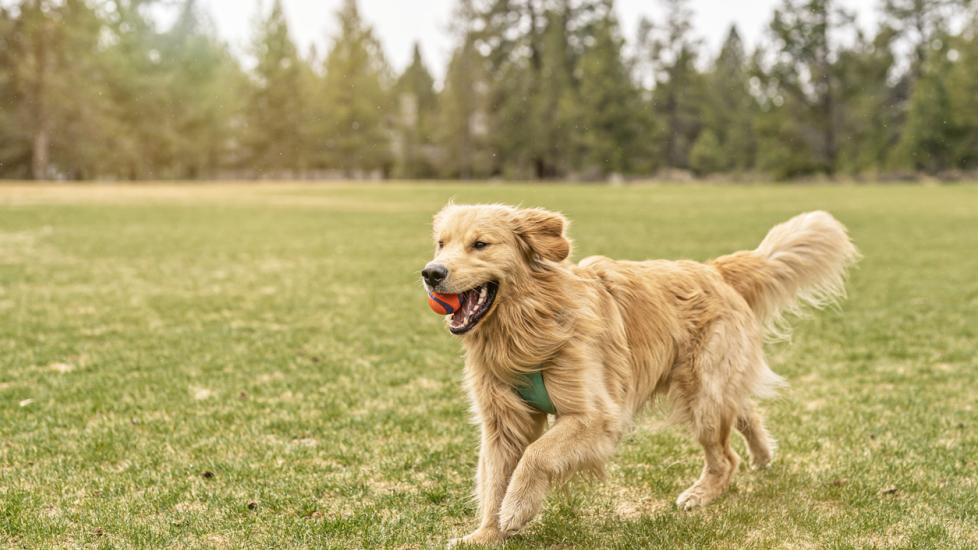Golden Retriever
Golden Retrievers are one of the most popular dog breeds in the United States for good reason—they are intelligent, loyal, easy to train, and very affectionate. “Goldens,” as they’re often called, make wonderful family dogs because they are great with young children and other pets when socialized from puppyhood.
Golden Retrievers are medium-sized sporting dogs that weigh 55–75 pounds, with females weighing on the lower end of this range. Their height can range from 21–24 inches tall. They have a broad head, short ears, deep chest, and muscular build.
Caring for a Golden Retriever

Golden Retrievers are known for their thick, water-repellent, lustrous golden coats. But their golden fur can range in color, so you can find white Golden Retrievers to red Golden Retrievers.
No matter the color, Golden Retrievers have a double coat. This means that they have a thick undercoat of short hair covered by a layer of longer hair. Due to this double coat, Golden Retrievers shed a lot. They also tend to develop matted hair behind their ears and on their hind limbs. So, Golden Retrievers require a lot of grooming—either at home or by a professional groomer—to keep their coats healthy.
Goldens have a moderate amount of energy, even in their senior years. They enjoy a wide variety of activities such as running, going on long walks, retrieving, and swimming. They make excellent therapy dogs and guide dogs for people with impaired vision.
Golden Retriever Health Issues

The average Golden Retriever lifespan is 10–12 years, and they’re typically healthy dogs. However, due to poor breeding, some Golden Retrievers may develop a handful of health issues.
Make sure to do your research when looking to adopt a Golden Retriever, or find a reputable Golden Retriever breeder so that medical issues are less likely.
Hot Spots
Due to their thick coats and love for swimming, Golden Retrievers are prone to developing hot spots, localized areas of skin that are inflamed and infected, most often with bacteria and/or yeast. Hot spots develop more often in warm, humid environments and after swimming because moisture gets trapped near the skin. This moist skin causes discomfort that leads to scratching, chewing, and licking. These behaviors then cause the normal microbes on the skin to multiply, and the skin becomes inflamed and infected.
A hot spot usually develops quickly and can lead to hair loss, redness, and moist skin that may ooze, crust, or develop thick scabs. If you notice any signs of hot spots in your Golden, take them to a veterinarian. Hot spots typically resolve quickly with medication.
Atopic Dermatitis (Atopy)
Atopic dermatitis (atopy) is an inflammatory and extremely itchy skin condition that Golden Retrievers are predisposed to. It can be triggered by environmental allergens (such as insects, fleas, pollen, dust mites, or mold) or by a food allergy, often to the protein in the diet. Goldens are believed to have a genetic predisposition.
Symptoms usually develop between 2–6 years of age, so regular veterinary visits are important to monitor your dog’s skin health. Golden Retrievers with atopy are constantly scratching, chewing, or licking themselves. This self-trauma leads to hair loss, thickened skin that can be red or black in color, or a rash consisting of macules (discolored skin) or papules (raised skin lesions).
Hypothyroidism
Hypothyroidism is an endocrine disorder that happens when the thyroid gland loses its ability to produce thyroid hormones, leading to symptoms such as:
-
Unexplained weight gain
-
Decreased energy level
-
Recurring skin and ear infections
-
Thinning of the fur
-
Dry, scaly skin
Golden Retrievers are predisposed to hypothyroidism and typically develop symptoms when they are middle-aged. Although this endocrine disorder is common, it can be well-managed with lifelong medication.
Find a CarePlus insurance plan to match your pet's needs
Learn about CarePlus, insurance plans with exclusive Chewy benefits
Hip and Elbow Dysplasia
Hip dysplasia is an inherited orthopedic condition where the hip joint doesn’t properly align. This can cause pain and, over time, arthritis. Hip dysplasia can develop in one or both hip joints.
Some Golden Retrievers are born with congenital hip dysplasia—which is rare—while others can develop this condition during their senior years. Symptoms include:
-
Slowness to rise from a lying position
-
“Bunny-hopping” gait when running
-
Reluctance to run, jump, or go up or down stairs
-
Holding the affected leg out to the side when sitting up
Reputable Golden Retriever breeders make sure their dogs are screened for this genetic condition, so it’s best to purchase a Golden Retriever puppy from a breeder that has had their dogs certified with a PennHIP evaluation. Hip dysplasia can be managed with joint supplements and certain medications, but in serious cases, surgical intervention may be required.
Elbow dysplasia encompasses several different inherited orthopedic conditions that ultimately lead to degenerative joint disease (DJD) within the elbow. X-rays or CT scans are used to diagnose elbow dysplasia, and the condition is treated with surgery, joint supplements, and/or anti-inflammatory and pain medications.
Eye Conditions
Golden Retrievers are prone to a few different eye conditions, including:
-
Pigmentary uveitis: An inherited eye condition where brown or black cysts develop on the eye. They are usually benign and develop when a Golden is at least 5 years old. Treatment usually includes eye or oral medications. Over time, pigmentary uveitis can cause cataracts and glaucoma, which require emergency treatment.
-
Progressive retinal atrophy (PRA): A disease where the eye’s retina slowly degenerates, leading to blindness. There is no cure for PRA, but blind Golden Retrievers can still live long, happy lives with proper care.
Cancers
Goldens can develop a few types of cancer as well. Some common cancers include:
-
Lymphoma/Lymphosarcoma: A type of cancer that originates in the lymph nodes and typically spreads to other organs. Lymph nodes that commonly enlarge with lymphoma are on the neck, behind the knee, and inside the thigh. There is a relatively high prevalence of this condition within the Golden Retriever breed.
-
Hemangiosarcoma (HSA): An aggressive form of cancer that most often originates in the spleen, liver, or heart in Golden Retrievers. This type of cancer forms a blood-filled tumor that can rupture at any time and cause a dog to bleed internally. A ruptured tumor can be life-threatening if not treated immediately.
Heart Problems
Subaortic valvular stenosis (SAS) is a genetic heart condition that Golden Retriever puppies inherit from their parents. It develops during the first year of life, so responsible breeding is key to ensuring prevention of this condition.
SAS occurs when fibrous tissue slowly forms in the heart and causes an obstruction of blood flow. Over time, this condition causes the heart to stop functioning properly, resulting in heart damage.
Golden Retrievers with SAS often have a heart murmur that can be heard during a routine physical exam, but dogs with mild to moderate SAS may not show any symptoms. However, those with severe SAS are lethargic, tired after short periods of exercise, may collapse, and can die suddenly.
What To Feed a Golden Retriever

Golden Retriever puppies should be fed a large-breed, high-quality puppy formula until they are 1 year to 18 months old. Once they reach maturity, they will need to be transitioned to a large-breed, high-quality adult.
Choosing an AAFCO (Association of American Feed Control Officials)-approved food is a great place to start, but your veterinarian can help you narrow down your options to find the best food for your Golden Retriever.
How To Feed a Golden Retriever
Full-grown Golden Retrievers do well with twice-daily feedings, in the morning and evening. Golden Retriever puppies need to eat more frequently—about three or four times each day on a consistent schedule.
Golden Retrievers love to eat, so a slow feeder bowl can be a great way to help them slow down their eating and prevent digestion issues. If your dog eats too quickly, it can cause vomiting and possibly bloat—an emergency situation where the stomach twists on itself.
How Much To Feed a Golden Retriever
Golden Retriever puppies have rapid growth spurts, which means it’s important to feed them puppy food when they are less than a year old to provide the extra calories that they need to grow to their full potential. Follow the feeding guidelines on the back of the bag of the large-breed puppy formula, based on their age and expected body weight.
Once a Golden Retriever is 1 year old, transition them to a large-breed adult formula that has fewer calories to prevent unwanted weight gain. Your veterinarian is your best resource for determining how much to feed your Golden Retriever to maintain a healthy weight.
Nutritional Tips for a Golden Retriever
Starting a Golden Retriever on a joint supplement early in life can help slow down or possibly prevent arthritis. Talk to your vet before giving your pup any supplements like Movoflex, Synovi Chews, Dasuquin, Cosequin, or Flexadin.
Another supplement to consider for a Golden Retriever is omega-3 fatty acid (fish oil). This helps to reduce inflammation in the joints, makes the coat more lustrous, and protects the skin barrier from allergens in the environment. Some good fish oil supplements are Nordic Naturals Omega-3 Pet, Vetoquinol Triglyceride Omega-3 Fatty Acids, and Nutramax Welactin Omega 3.
Behavior and Training Tips for Golden Retrievers
Golden Retriever Personality and Temperament

Golden Retrievers generally have a great temperament—they are often friendly with children, other pets, and even strangers. They enjoy being the center of attention and being petted. In fact, Goldens will often nudge you gently so that you continue to pet them.
Golden Retriever Behavior
Golden Retrievers have been known to eat things they shouldn’t, especially when they are puppies. They may try to eat socks, shoes, furniture, or get into the trash. To keep your Golden Retriever safe and prevent digestive issues or gastrointestinal obstructions, keep a watchful eye on them when they are puppies.
Cute Golden Retrievers have a lot of energy and require lots of exercise to be happy and healthy. They are considered a quiet breed, as they bark infrequently and are not known for digging up yards.
Golden Retriever Training
It is usually easy to train Golden Retrievers due to their kind temperament and their eagerness to please. They are very food-motivated, so using small treats as rewards is highly effective. Socialization is also a very important part of training Golden Retrievers as puppies.
Fun Activities for Golden Retrievers
-
Agility
-
Obedience training
-
Tracking
-
Dock diving
-
Bird hunting
-
Fetch
-
Long walks or runs
Golden Retriever Grooming Guide
Grooming a Golden Retriever is an important part of their care, as these dogs have thick coats and sensitive skin. Their eyes and ears can require special attention, too.
Skin Care
Regularly checking your Golden Retriever’s skin can help you detect hot spots or other issues that develop. If you notice an increase in scratching, chewing, or licking, talk to your veterinarian.
Coat Care
Golden Retrievers have a dense double coat, so they shed a lot. It’s important to brush a Golden Retriever at least once or twice every week to prevent matting, especially behind the ears and on the hind limbs.
Regular brushing with a FURminator brush can also help to reduce the amount of shedding inside the house.
Eye Care
Golden Retrievers often have a mild amount of clear or brown eye discharge, which is normal. You can use a moistened washcloth or a special eye wipe to clean off any eye discharge.
Ear Care
Golden Retrievers are prone to ear infections for several reasons.
-
They have ears that hang down loosely and contain numerous glands that help to produce wax, which can trap moisture and lead to inflammation and infection within the ear canal.
-
Golden Retrievers love water, and if they get any in their ears during swimming or a bath, this can also lead to an ear infection.
-
Because Golden Retrievers can also have allergies or hypothyroidism, ear infections can be a common secondary health issue.
To minimize the risk of ear infections in Golden Retrievers, it’s best to clean their ears with a product that contains a drying agent (like EPIOTIC® Advanced) every two to three weeks for maintenance, plus after swimming or bathing.
Considerations for Pet Parents

Golden Retrievers make great family dogs due to their jovial and friendly disposition. They can be pretty energetic, so pet parents should establish a daily exercise routine with their Golden. It’s also important to train them early about what are and are not appropriate things to eat—this may mean preventing access to things like garbage cans, laundry, and house supplies.
However, Golden Retrievers do have a lot of predispositions for illnesses. This means that regular vet visits and additional vet costs will be common while caring for a Golden Retriever. Consider purchasing pet insurance to offset some of the cost of veterinary care.
They also have a thick, long coat that is prone to matting, so consistent grooming and brushing are necessary to keep the coat healthy and manage their shedding.
Golden Retrievers FAQs
Is a Golden Retriever a good family dog?
Yes. Golden Retrievers make excellent family dogs due to their wonderful temperament. They are friendly with children and other pets. They do not mind when company comes to visit.
Are Golden Retrievers smart dogs?
Yes. Goldens are very intelligent, which makes them easy to train as puppies. They can also be trained to be therapy dogs, guide dogs for people who are blind, or search-and-rescue dogs.
How much do Golden Retrievers cost?
The typical Golden Retriever price is $1,000–$3,500 if purchased from a reputable breeder. You can also find Golden Retrievers for adoption or rescue.
What are the three types of Golden Retrievers?
There are British/English, Canadian, and American Golden Retrievers. The differences between these types are minimal and have to do with their physical characteristics, like the color of their coat.
The British or English cream Golden Retriever typically has a thick blond coat with a stocky built, short muzzle, and blocky forehead.
The Canadian Golden Retriever has a taller, leaner figure with a thinner and darker coat that tends to have a reddish hue.
The American Golden Retriever is usually lanky and has a feathered fur coat that is truly golden in color.
But if you ever think you see a black Golden Retriever, you’re probably looking at a Flat-Coated Retriever.
Is there a difference in the size of male and female Golden Retrievers?
Yes. According to the American Kennel Club (AKC), males weigh 65–75 pounds and females weigh 55–65 pounds. Males are also taller than females by as much as 2.5 inches.
What’s the difference between a Golden Retriever vs. Labrador Retriever?
Golden Retrievers and Labrador Retrievers share a lot of similar characteristics, but they’re two completely separate breeds. While Goldens are always a shade of gold or yellow, Labs come in three colors: yellow, black, or brown. Golden Retrievers also have a thicker and longer coat than Labradors.
References
Help us make PetMD better
Was this article helpful?
